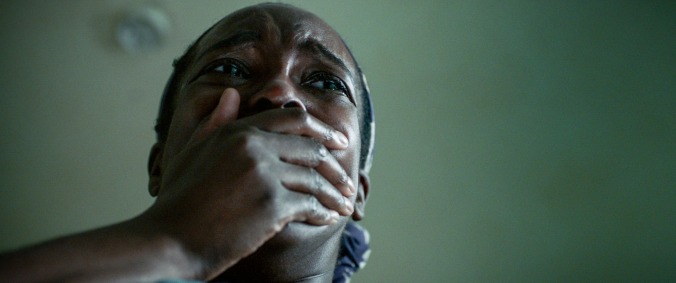Most horror is grounded in something real. In His House, the feature debut of writer-director Remi Weekes, it’s the terror of war-weary Sudan and the tired, huddled masses fleeing a brutal life that nonetheless shaped who they’ve become. Bol (Ṣọpẹ́ Dìrísù) and Rial (Wunmi Mosaku) travel by land and sea, eventually sailing under the cloak of night to seek asylum on the shores of the U.K. Their arrival is bittersweet, to say the least: An accident claims their daughter along the way, and they’re briefly interred at a cold, uncaring detention center, before being granted filthy housing in a nondescript English town. What follows is a potent, heart-wrenching spin on the classic haunted house story, buoyed by two stellar lead performances.
While the town the couple settles in isn’t specific, the environment holds paramount importance in Weekes’ script, based on a story by Felicity Evans and Toby Venables. If the house itself is frightening, the world beyond their front door might be worse. From microaggressions to the kind of racism that doesn’t even bother to look over its shoulder before speaking, the hostility that the pair deal with is depressingly believable. Squinting eyes peek out from every window like menacing, nationalistic versions of Mrs. Kravitz in Bewitched. Meanwhile, at the frigid immigrant detention center, officials express no genuine investment in the people they’re assigned to help; Bol and Rial must petition their humanity before an aloof staff that can’t be bothered to look them in the eyes. Their presence in the U.K. is probational: They are forbidden from taking jobs, leaving them at the mercy of meager government benefits alone.
Bol and Rial are appreciative for the roof over their heads, even when the lighting proves faulty and the walls stained. They settle in and attempt to make the grubby house a home. But they begin to endure awful night terrors—strange noises and bizarre visions. After a while, Bol and Rial suspect that they are the targets of an old folktale monster. In one brilliantly performed scene, Bol, who is reluctant to tell the social worker (Matt Smith) that he suspects a vengeful witch from their homeland has followed them, instead blames the house’s damage on rats and requests to be relocated. Anyone who has watched talking-head pundits ramble about immigration issues can guess the disdainful response that comes his way, a tut-tutting of the refugees for being ungrateful. There are even shades of intra-racial tension; a group of Black youths mock Rial’s accent when she approaches them. Weekes explores the nuanced layers of tribalism, a colonial-brained society, and genocidal trauma with a deftness that’s impressive for a storyteller new to features.
He displays a solid grasp of craft, too, providing the level of dimness required for a horror movie with plenty of shadow play, while still keeping his main players lit well enough to showcase their features (and horrified expressions). It seems like a simple task, but cinema has a history of poorly lighting its dark-skinned subjects to the point of campfire uncanniness. Cinematographer Jo Willems wonderfully composes evening scenes so that the eye is drawn exactly where it needs to go, and neutral colors and blues further emphasize the language of warmth and coldness depending on the region. On the downside, composer Roque Baños’ score, while surely solid on its own, competes with the film’s most tender moments to the point of distraction—a confusing choice for a movie whose actors prove more than capable of investing the audience in the emotional plight of the characters. (Speaking in both Dinka and English, Dìrísù and Mosaku expertly oscillate between subtlety and hysteria.)
In the end, His House is an intimate tale that externalizes an inner battle of wills within two traumatized people determined to start anew. Sure, there are bumps in the night—good ones. The scares are well-constructed because Weekes does the work of establishing dread, keeping the pace tight with a 93-minute runtime, and applying the jump-scares in a few unexpected places, yielding some surprises even for the seasoned horror fan. But setting aside the banging in the walls, the odd substances, and the jarring sightings, what we’re really watching is a couple of people who have had a rough go of it and are barely hanging on. Although their grief is specific, Bol and Rial are also stand-ins for all asylum seekers who’ve lost someone on their journey to peace and safety—and for those still burdened by the expectation of playing the “good,” docile, indebted immigrant. Weekes interweaves the survivor’s guilt of harrowing immigration stories with an anxiety and a guilt specifically rooted in the Black, British, and African experience. Wonky score aside, he’s twisted the time-honored haunted house yarn into something unique and surreal.


 Keep scrolling for more great stories.
Keep scrolling for more great stories.
